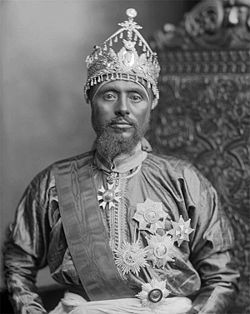I was lucky that there were people I know from the Caribbean in Ghana. They knew almost everyone, including exiles from the U.S.A. and from various African countries.
Neville Dawes, a lecturer in English at the University of Guyana and a Jamaican, had gone back to Ghana, his wife’s home. In Guyana, Dawes and his wife were very popular and came to Buxton often, bringing visitors to the country. This is how I got to know my own fellow villager, the famous Ras Makonen (pictured above), Emperor Haile Selassie‘s father of Ethiopia, and Nana Kobina Nketsia., the traditional chief of the Essikado traditional area in Ghana.
SEE ALSO: Pan-Africanist, Activist Remembers Ghana’s & Guyana’s Independence
They were part of a mission dispatched by Pan-Africanist and first President of Ghana Kwame Nkrumah and led by Professor Willie Abraham, a philosopher at Legon University, Ghana, around 1963 in an attempt to reconcile the People’s Progressive Party (PPP) leader Cheddi Jagan and the People National Congress (PNC) leader Forbes Burnham.
Neville Dawes made sure that I knew everyone possible. He had come to Guyana as a supporter of the PPP only to discover hidden contradictions in the society and find that there were other human resources there as well.
Guyanese who had lived and worked in Ghana up to that time were Joyce Gittens, once a secretary to Nkrumah; Rockliffe Pitt, construction manager for the government; the Dr. Michael Abbinsetts and his wife, and from the United States acclaimed writer Maya Angelou and Julian Mayfield who then edited the African Review.
At news of my traveling, the African Society for Cultural Relations with Independent Africa (ASCRIA) members convened at short notice at our borrowed headquarters in Third Street, Alberttown, Georgetown. calling for donations as a token to the African Liberation Movement I was a modest figure in.
After much discussion, it was decided that the money should be donated to a Popular Movement for the Liberation of Angola (MPLA) exile people knew, and there were many exiles in Ghana.
In this drawing room ceremony, I made the brief statement that we [Guyanese], too, were not yet independent, but that we knew that the conditions in the Portuguese colonies demanded a long and bitter struggle. The Angolan delegate replied graciously as though he had received a fortune and noted the significance of the very idea of support from Africa’s children across the Atlantic.
Even in that small gathering, though, there was a discordant voice.
A male who sat in a corner of the room shouted across, “And why are you here and not in Angola helping to fight and free your country and your people and your country? Tell us!”
An embarrassed and awkward silence ensued.
Every Ghanaian I met for the first time — and it turned out to be true of every African I met from other countries — would say to me as a visitor, “You are welcome.” This was going through my mind when Neville Dawes turned to me and said, “Sydney, say something to this young man.”
I didn’t think I had any voice in the matter, but I simply said, So you think they can fight a revolution like that in isolation and it is nobody’s concern?
Between the eyes and the silence, that young man felt a real chill in the room.
Then one of the persons present touched his shoulder and said, “What would the Old Man think of such a statement?”
He became defensive, saying, “Ah! But I haven’t said anything the Old Man disagrees with. He, himself, calls for struggle all the time. Brother, don’t get me wrong, you and your comrades are very welcome to be here.”
I was soon to know who the Old Man was.












